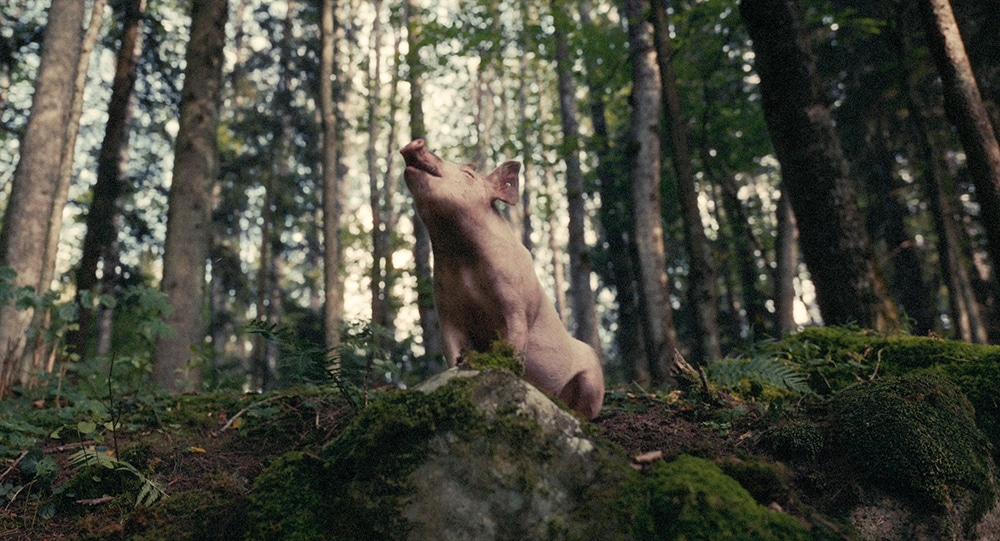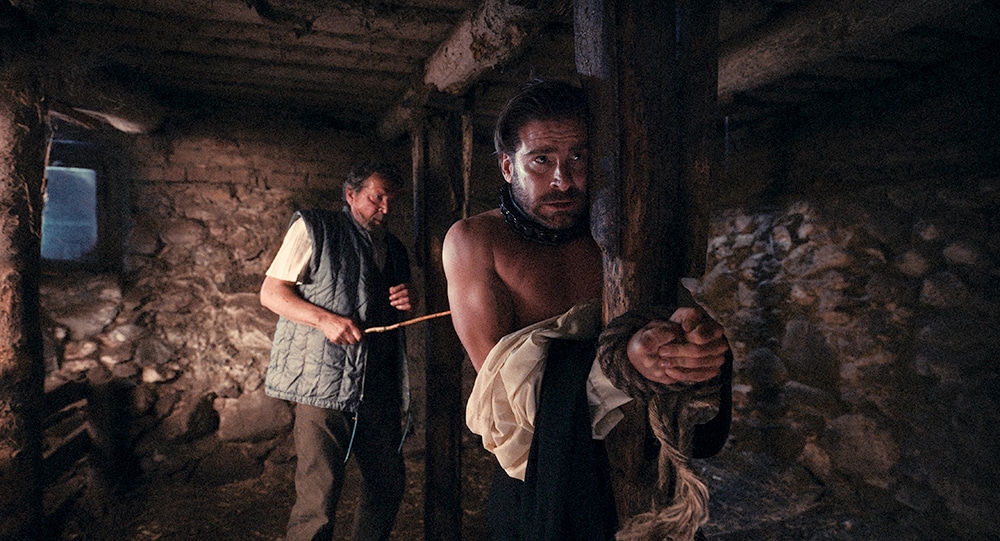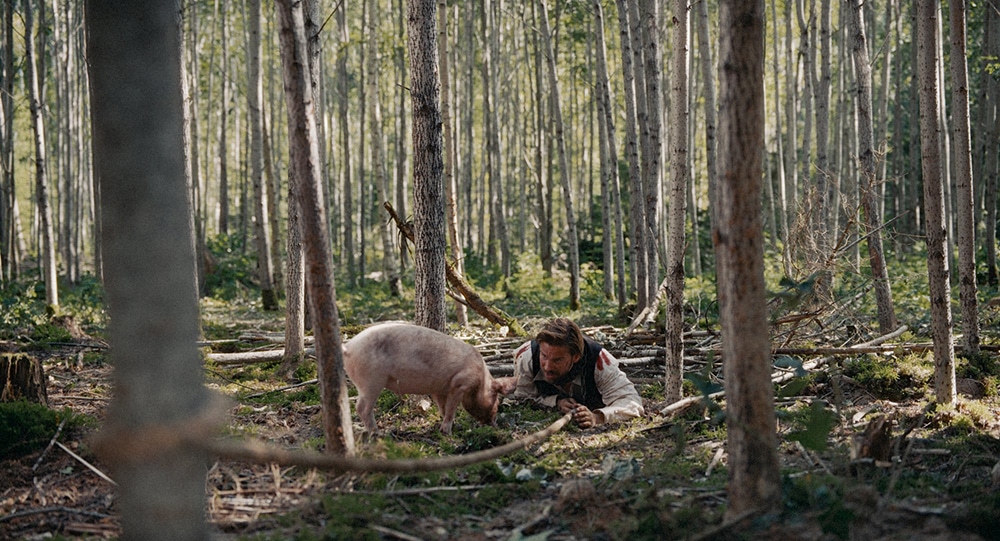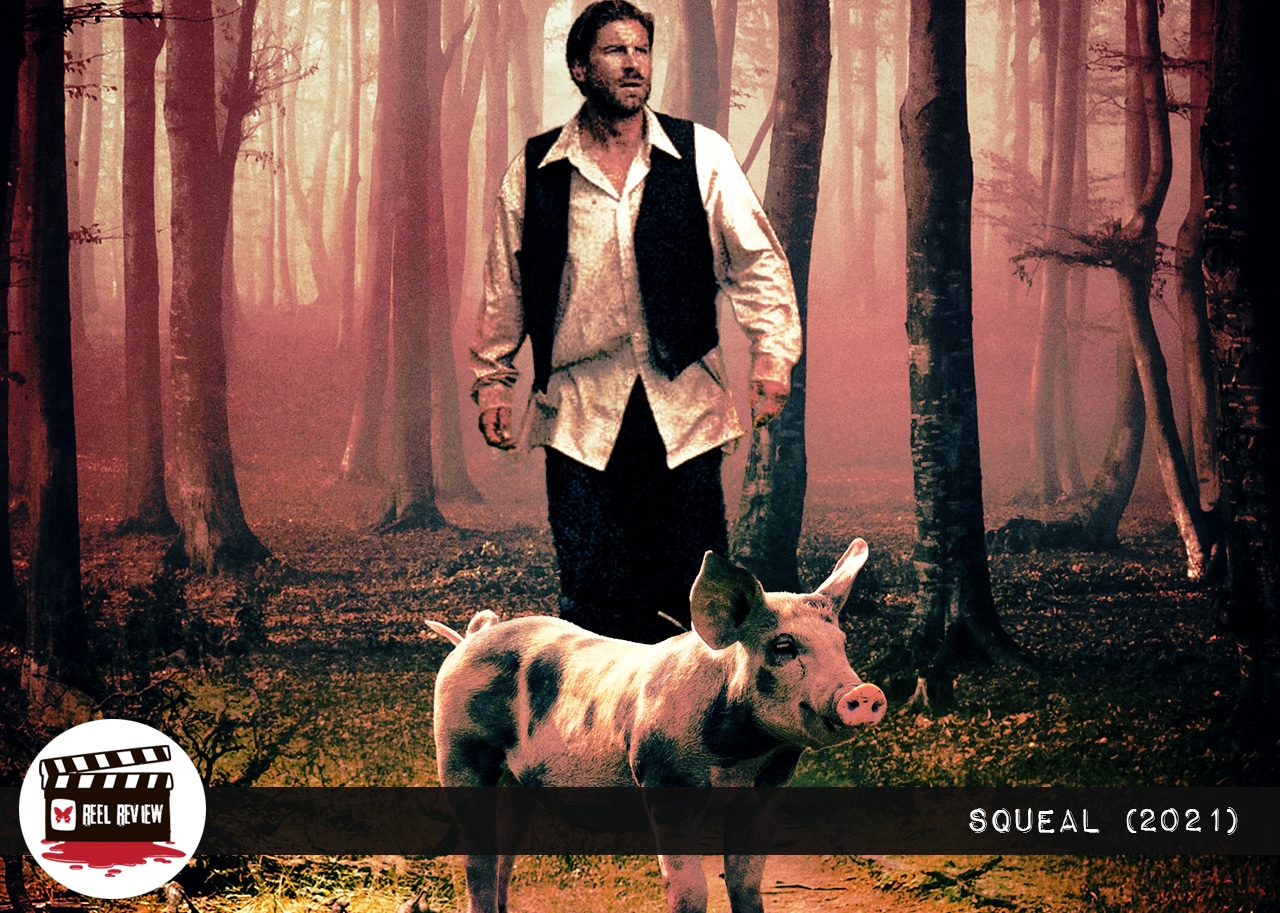Beautiful, bleak, surreal, and enchanting, fans of films off the beaten path should “Squeal” with delight at this impressive dark fairytale.

From the opening credits over Handel’s “Water Music Suite #2”, there’s a whimsical, fairytale-like atmosphere to Aik Karapetian’s Squeal (formerly titled Samuel’s Travels).
But like the original versions of our most popular fairytales before they were sanitized by Brothers Grimm — steeped in macabre history and designed as parables with a moral twist — this fairytale isn’t the stuff of children’s bedtime stories.
Like those early stories that featured sadistic parents, painful punishments, and young children being devoured by wild beasts, this fairytale is twisted…revealing man’s baser animal instincts.
We open on a shot of an adorable pig, wistfully staring up at a jet airplane passing overhead, before running through a lush forest as his owner, the farmer’s daughter, Kirke (Laura Silina), desperately calls out after it.
The soothing, cheerful voice of the film’s narrator (Uldis Verners Brūns, reminiscent of Michael Hordern’s charming narration for the original Paddington series) gives us the first hint that something darker may be lurking below the surface of this fanciful yarn when he utters the line:
“It’s better to die of starvation from freedom than to be satiated in slavery.”
And that potent turn of phrase sets the stage for what will become the central conflict of our story.
We then meet the “main hero of our tale,” Samuel — or Chef Sam as he likes to be called (Kevin Janssens) — as he is driving down a dirt road in remote Eastern Europe.

We learn he’s a stranger in a strange land, looking for his father, a man he has never met or seen before.
Lost and distracted, he accidentally hits the piglet just as it’s exiting the forest onto the road. He places the injured pig in the back of his car and drives to find help. Thinking the pig has passed, he pulls off to the side of the road to bury it. That’s when he encounters Kirke, whom he’s relieved to learn speaks English.
It’s late at night, and he offers her a ride back home. Through narration, we learn that the poor little piglet is devasted to be returning to its miserable, beast-like life surrounded by wretched human beings.
And that gives us little hope for the plight of our hero.
After some seemingly kind-hearted hospitality, in which Samuel and Kirke share a meal and some vodka, she offers him a place to sleep for the night and invites him to stay as long as he wants. He tells her he must leave in the morning, which saddens her as she believes him to be a heavenly gift from her late mother.
When Samuel wakes up, he’s naked. Kirke is standing in his room with two men — her father, Gustavs (Aigars Vilims), and a farmhand named Jancuks (Normunds Griestins), who hopes to marry Kirke and is, therefore, disgusted with Samuel’s presence. Neither of the men speaks any English, adding severely to Samuel’s visible confusion at the situation he now finds himself in.
Jancuks knocks Samuel out, and he wakes up to find a collar has been placed around his neck, and he is now chained up in the pigsty.
From this point forward, Samuel is exclusively referred to by the dehumanizing title of The Foreigner, treated like an animal and fed pig slop, mercilessly beaten, and forced to do chores around the family farm.
While at first rightfully scared and angry at his forced captivity, Samuel learns to adapt to his new life — even finding a sense of peace and belonging.

He begins to earn the trust of Gustavs while further encountering the wrath of jealous Jancuks. He even saves Kirke when Jancuks attacks her in a fit of rage over her rejection of him.
Though Jancuks is a despicable character you’ll love to hate, Karapetian ensures that he — like every character in the film — is complicated and worthy of some degree of sympathy. Like Samuel, his status-hungry father and uncle treat him like a subservient animal. He has been groomed to believe that power is about taking what you want and exerting control over those weaker and more vulnerable than you.
It’s a recurring theme in the film as clear parallels are drawn between the treatment of the men and how animals are often treated by their owners — with no regard to what the creatures might think or feel.
Soon, Kirke falls in love with Samuel, even as he remains her captive pet. And we discover that nothing is as black and white as it first seemed. Character motivation comes into focus, and empathy is introduced into horror.
In a particularly nasty scene, Samuel is forced to clean up after a pig is slaughtered with a sledgehammer by Gustavs when Samuel refuses to do it (animal lovers take comfort in knowing the murder happens offscreen, though it’s still upsetting).
It’s then Samuel realizes the pig he saved is highly intelligent and able to communicate with him. The pig still craves his freedom and wants to help Samuel find his as well.
But what does Samuel want?
The cast of Squeal is extraordinary.

Powerful performances — especially from Janssens, who is utterly captivating, despite barely speaking — keep the fantastical story grounded and the audience invested.
Though the story is often grim, everything about this film is beautiful — from the stunning cinematography to the exquisite classical soundtrack.
Karapetian, who co-wrote the film with Aleksandr Rodionov, cites the Greek myth of the goddess Circe as a major inspiration for the film. As the legend goes, Circe turned Odysseus’ traveling companions into swine. This led to Odysseus staying with her and accepting her love.
Ultimately, this is a dreamlike, allegorical tale about the dark side of human nature and what we’re willing to sacrifice out of fear and desperation. It tackles heavy themes of abuse and objectification and the push-pull between comfort and freedom, loneliness and servitude.
Squeal is a film that challenges our perceptions and makes us question our morality. It reminds us that life is full of impossible choices.
Like the hero of our story, we are made to ask what matters more: security or freedom. And like life, Karapetian offers no easy answers, no clear moral lessons.
What he does offer, however, is an extraordinary journey. It’s a must-see for fans of trippy, arthouse horror films and dark, folkloric fairytales.















Follow Us!